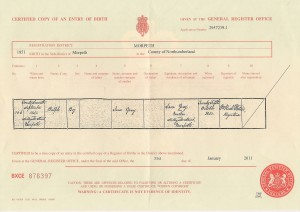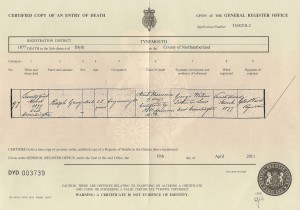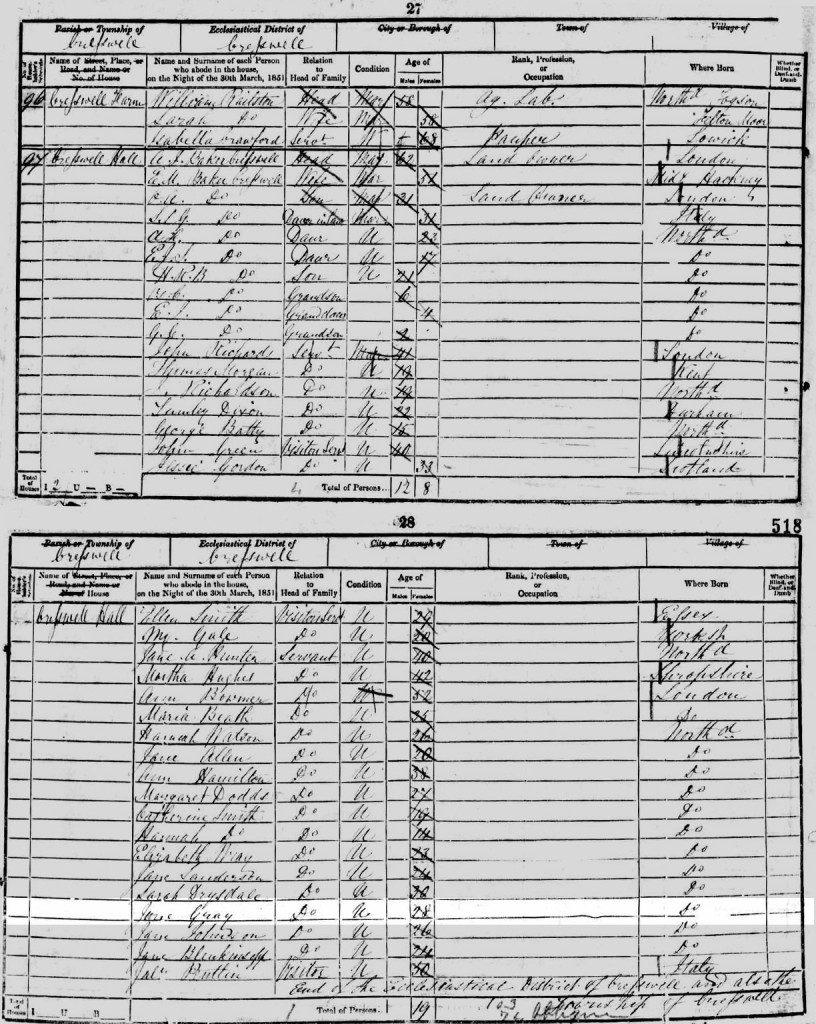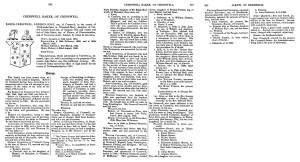A family legend told to my mother by my grandmother was that there was an ancestor, “Jane Gray”, who had an affair with a landed gentry which resulted in an illegitimate child. I had uncovered a fair bit about my grandmother’s ancestry and hadn’t found anything that confirmed my grandmother’s story. After I realised I had made a mistake with one my ancestral lines, I soon discovered that the legend could be true after all.
My grandmother’s great-grandfather — my 3x-great-grandfather — was called Ralph Gray and was born in 1851. He died very young at the age of 25, leaving his wife pregnant with their youngest son, and two older sons. I had initially believed Ralph’s parents to be George Gray (which was the name listed as Ralph’s father on his marriage certificate) and Deborah Thompson, and traced this line back a number of generations. Another member on Ancestry contacted me to let me know that he believed I had made a mistake, as he was descended from George and Deborah, and their son Ralph definitely did not marry Ann Hedley (my 3x-great-grandmother).

I looked back on my research but I couldn’t find another Ralph Gray in the census records before he was married, with a George Gray as his father. I decided to go back to back to basics and order his birth certificate. Upon searching for a Ralph Gray born a year either side of 1851 in the Northumberland area, there were four possibilities. After ordering some certificates, I received one that initially thought was incorrect, but it turned out to be the right one after all. This Ralph was born on the 27th September 1851, illegitimately, to a Jane Gray in Hillgate Street in Morpeth, Northumberland.

Initially, I was still completely a dead end, so tried another route and ordered Ralph’s death certificate, which would at least satisfy my curiosity of why he died so young. As well as learning he died of acute pneumonia after suffering for 9 days, his death certificate did also reveal the informant to be a George Wilson, listed as Ralph’s “father-in-law”. This was confusing as his wife’s name was Ann Hedley, and his father-in-law was called William Hedley. After some internet searching, I discovered that the term “father-in-law” was sometimes interchanged with “step-father”. From this, I decided to try and find a marriage between a George Wilson and a Miss Gray, and there was one that matched; a marriage in 1862 in Morpeth to a Jane Gray. It would appear that George was indeed Ralph’s stepfather after all, with Jane and George marrying when Ralph was about 11.
Now I had to track down the family in the censuses. I found Jane and George living at 20 New Stone Row in East Cramlington, Northumberland in the 1871 census. Ralph was living with them, recorded as George’s son under the name of Ralph Gray Wilson, as were George’s children from his first marriage, along with Jane and George’s young son Robert. A lot of my other ancestors and their families also lived in New Stone Row, in fact Ralph’s future wife Ann was living a dozen doors down.

Going back to the 1861 census, I have been unable to find Jane, but Ralph is living with his aunt, Jane’s sister Mary Ann (Elliott), and his grandmother Ann in Blackwell, Durham. Going back to 1851, Ann is living at home with her grandson Samuel in Hillgate Street in Morpeth. But here’s where it gets interesting — Jane can be found working as a servant at Cresswell Hall in Cresswell, on the Northumberland coast, a few miles from Morpeth. Here she is working for the Baker-Cresswell family, a long established Northumberland landed gentry family. The census was taken on the 30th March 1851, and Ralph wasn’t born until the September, so Jane would have been pregnant at the time.
I don’t have any concrete proof who Ralph’s father was, and I most likely never will. I can, however, make an educatated guess. If we are to believe my grandmother’s family legend, then a male member of the Baker-Cresswell family would certainly fit with the story. My best guess would be Oswin Addision Baker-Cresswell, who was living with his wife and children at Cresswell Hall in 1851. The head of the family, Oswin’s father, Addison John Baker-Cresswell, could also be a potential candidate, but he was a fair bit older than Jane was, at 62. Certainly possible, but I still think Oswin is more likely.

As there is a chance that I am descended from the Baker-Cresswell family, I decided to look into them and managed to find some information on them in Burke’s Landed Gentry. The family is a very interesting one, it seems that Addison John Cresswell took on the extra surname of Baker when his wife inherited property from her cousin, John Baker. It also seems that Addison’s parents were Frances Dorothea Cresswell and Francis Easterby. Francis took on his wife’s surname of Cresswell when she purchased her twin sister’s half of the Cresswell estate. I do find it interesting how noble families take on different names depending on land ownership. In Burke’s Landed Gentry, the Cresswell family lineage can be traced back to a Sir Robert de Cresswell in the early 13th century. If only all families were recorded in this way, it would make genealogy much easier!